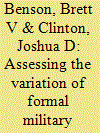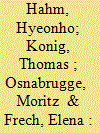| Srl | Item |
| 1 |
ID:
147315


|
|
|
|
|
| Summary/Abstract |
Many critical questions involving the causes and consequences of formal military alliances are related to differences between various alliances in terms of the scope of the formal obligations, the depth of the commitment between signatories, and the potential military capacity of the alliance. Studying the causes and consequences of such variation is difficult because while we possess many indicators of various features of an alliance agreement that are thought to be related to the broader theoretical concepts of interest, it is unclear how to use the multitude of observable measures to characterize these broader underlying concepts. We show how a Bayesian measurement model can be used to provide parsimonious estimates of the scope, depth, and potential military capacity of formal military alliances signed between 1816 and 2000. We use the resulting estimates to explore some core intuitions that were previously difficult to verify regarding the formation of the formal alliance agreement, and we check the validity of the measures against known cases in alliances as well as by exploring common expectations regarding historical alliances.
|
|
|
|
|
|
|
|
|
|
|
|
|
|
|
|
| 2 |
ID:
169323


|
|
|
|
|
| Summary/Abstract |
What type of trade agreement is the public willing to accept? Instead of focusing on individual concerns about market access and trade barriers, we argue that specific treaty design and, in particular, the characteristics of the dispute settlement mechanism, play a critical role in shaping public support for trade agreements. To examine this theoretical expectation, we conduct a conjoint experiment that varies diverse treaty-design elements and estimate preferences over multiple dimensions of the Transatlantic Trade and Investment Partnership (TTIP) based on a nationally representative sample in Germany. We find that compared to other alternatives, private arbitration, known as investor-state dispute settlement (ISDS), generates strong opposition to the trade agreement. As the single most important factor, this effect of dispute settlement characteristic is strikingly large and consistent across individuals’ key attributes, including skill levels, information, and national sentiment, among others.
|
|
|
|
|
|
|
|
|
|
|
|
|
|
|
|